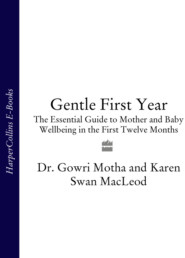По всем вопросам обращайтесь на: info@litportal.ru
(©) 2003-2025.
✖
The Gentle Birth Method: The Month-by-Month Jeyarani Way Programme
Автор
Год написания книги
2018
Настройки чтения
Размер шрифта
Высота строк
Поля
Baladi choornam (my Ayurvedic formulation) is very good for vata mothers.
Herbs
The following herbs can balance vata:
Black pepper
Dill seeds
Cumin seeds
Basil leaves
Parsley
Ginger
Music
Relaxing and calming music is very good for balancing vata.
Chanting is beneficial. Many cultures and different religious persuasions use chants (see pages 82-3 for some mantras). The Gayatri Mantra is nondenominational.
If you are religious, and depending on your religious leaning, you may like to recite prayers, such as the rosary, or Buddhist or Benedictine chants that instil peace and harmony.
Physical Treatments
Massage with oils can be amazingly effective in reducing excessive vata.
Self-massage or being massaged by your partner on a regular basis, for 20-40 minutes, is recommended. Suitable oils are virgin olive oil, or sesame oil.
Essential oils can also be used to reduce vata – try lavender, rose, or jasmine oil. Use from 4 to 10 drops in 20ml of a base oil. This can be used for self-massage or by a practitioner during general or Creative Healing massage.
Reflexology reduces vata, calms the mind and gives mental clarity. It also improves digestion and speeds up gut motility, thereby relieving constipation.
Vata Labour Issues
Factors to consider during delivery:
The pelvis is usually smaller.
The nervous disposition of vata mothers means they may experience more pain if not prepared effectively for birth.
Lots of preparation, both mental and physical, is needed to avoid surgical intervention.
Lots of low-back massage as preparation for labour will facilitate a manageable labour and gentle birth.
Vaginal oils and stretching techniques as preparation for birth are invaluable in preventing instrumental delivery.
Vata mothers need continuous massage during labour. Oil massages on the back, neck, shoulders and lower limbs are very beneficial during labour.
Vata mothers are more prone to having a retained placenta. This is not a big problem and doctors routinely administer an injection that forces the body to expel the placenta. However, many of my mothers – aiming for a natural birth – are not keen to submit to drugs at this late point in their baby’s birth, so in my self-hypnosis classes in London, I talk the mother through a hypnotic sequence in which she visualizes her body producing a surge of oxytocin (the hormone that encourages contractions) 15 minutes after the birth of the baby, thereby expelling the placenta. I have found this technique to be very effective on my vata mothers. If you are a vata mother, you can guide yourself through a short visualization of this hormonal occurrence – one or two minutes a day will be enough. You don’t need any medical expertise to do this – simply by suggesting this automatic hormonal production whilst your mind is deeply relaxed and receptive, you can pre-condition your body to expel your placenta within 10-15 minutes after the birth.
Vata mothers can have longer labours due to poor expulsive forces during labour i.e. poor uterine contractions, or uncoordinated uterine action, which can lead to slow dilation of the cervix.
Pitta Mothers
Typical characteristics
Skin redness
Medium-size body frame
Slightly oily skin
Fluid retention
Angry
Mentally irritable and edgy
Quick tempered
Intolerant of others’ behaviour
Experiences skin burning sensations
Feels too hot all the time
Can’t tolerate hot weather
Hates closed environments
Prone to feeling faint
Prone to increased sweating
Good memory
Sound sleeper
Pitta in balance: perceptive and intense
Pitta out of balance: angry, impatient and frustrated
During Pregnancy
Prone to bleeding in early pregnancy






